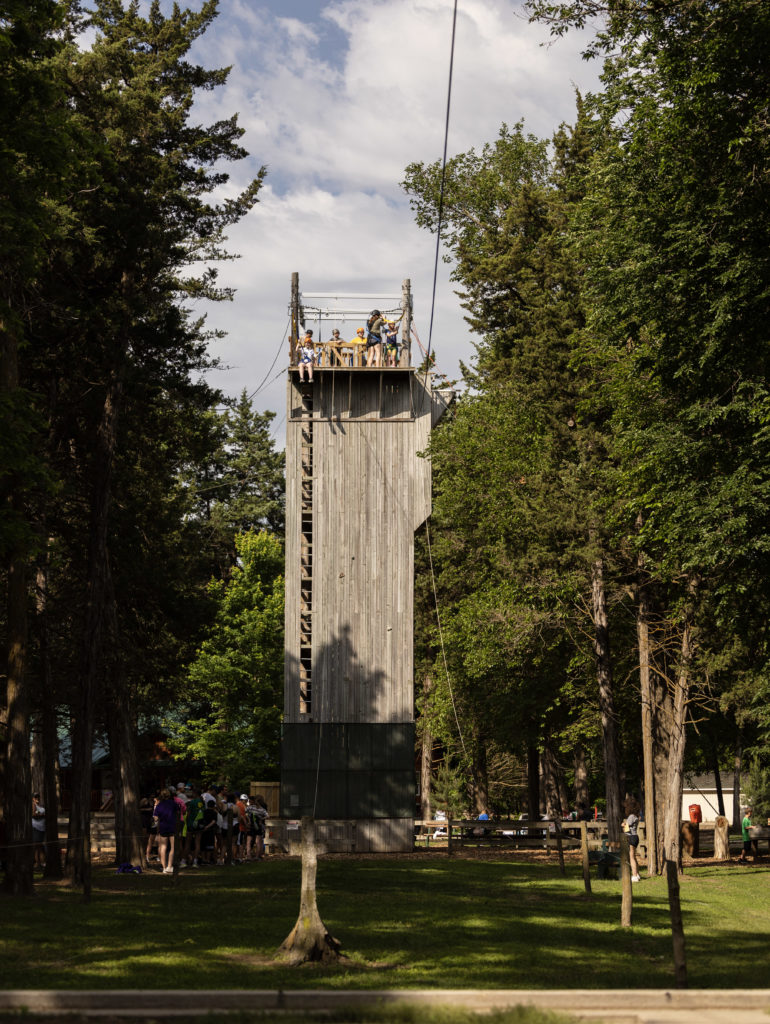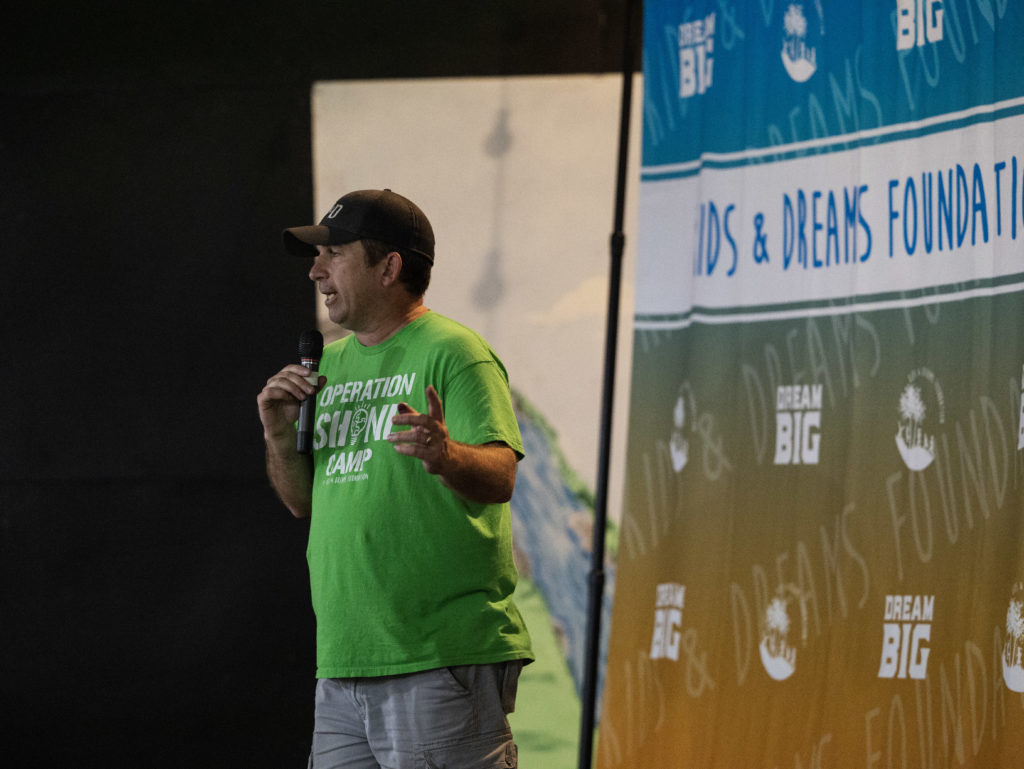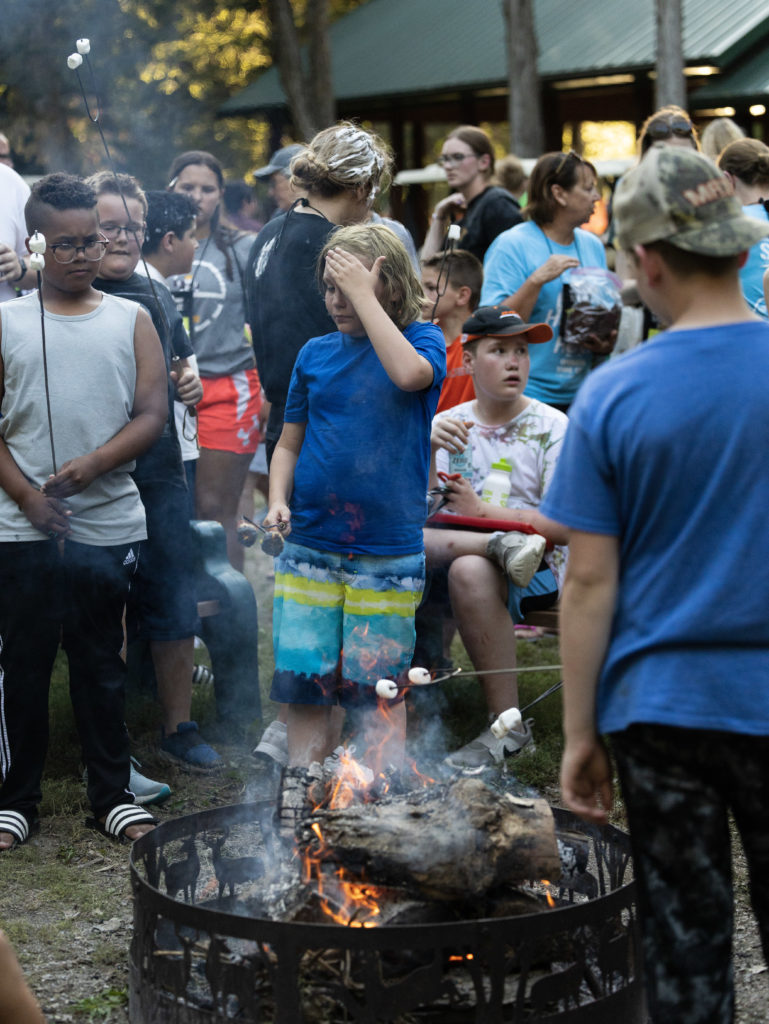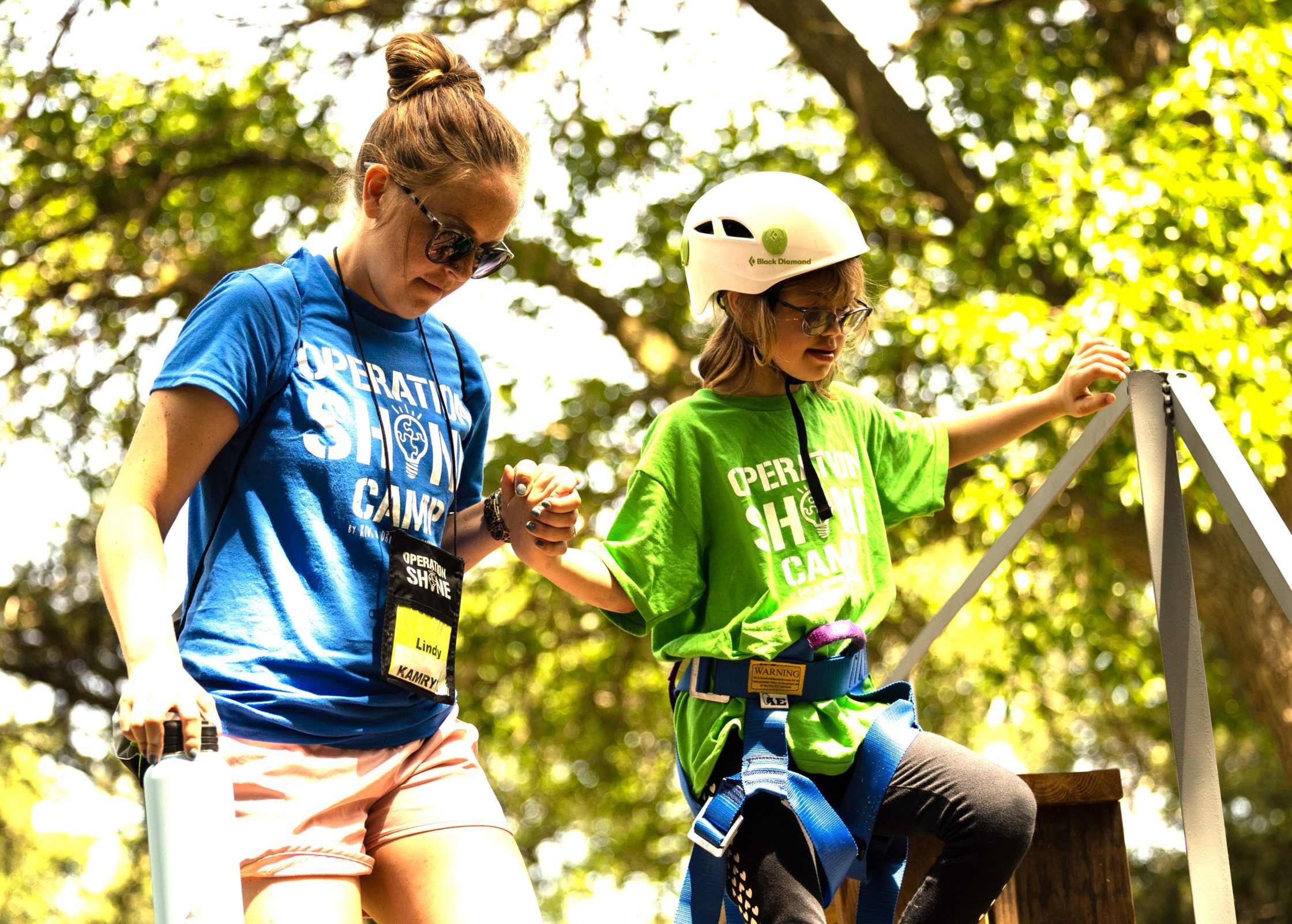Briggs Whalen sits at the edge of a 42-foot-tall tower just outside Central City, gripping his harness as his feet dangle over the side. A sea of blue and green T-shirts gather below, each person craning their necks as they shield their eyes from the sun.
The 11-year-old from Marquette stares down the 100-yard zipline and the crowd begins to chant. There are failed countdown attempts, and Briggs starts to stand up.
“If you do it, I bet you’ll feel really proud of yourself,” a fellow camper yells. “Maybe you’ll inspire me to do it, because I’m a little scared, too.”
Briggs contemplates the zipline again. He decides against it. He climbs down the tower. When he reaches the bottom, the crowd still cheers.
On a hot day in early June, even though he didn’t jump, Briggs tried something new. And at Operation Shine Camp, trying something new is always something to celebrate.

Briggs is one of 50 campers at the June session of this summer camp for 7- to 12-year-olds on the autism spectrum. The camp is run by Kids and Dreams Foundation, an organization Aaron Bly founded in 2014 after his son, Trae, was diagnosed with autism.
Bly knew his son would never be able to attend existing summer camps like neurotypical kids. So, after establishing a relationship with Covenant Cedars Bible Camp, Bly and his team worked for six months in 2015 to assemble their first Operation Shine Camp overnight session.
This year, the organization has expanded to offer a day camp and overnight session in Central City. It’s also offering an additional July overnight session in Maxwell.
On June 10, cars pulled into the camp driveway to drop campers off. “Big Camper” volunteers for the weekend waited at the end with signs and open arms. Parents, campers and volunteers moved to a sensory activity together, allowing both campers and parents time to warm up to their weekend support team before leaving.
“Those parents get to see right away that we’re taking this seriously, that we’re focused on their child specifically,” Bly said.
For the rest of the weekend, campers are free to explore. They form lines along the horseriding gate, try their hand at archery and fishing and experiment with tie dye. Some move toward the harness activities, rock climbing or riding down the zipline tower. Others craft bug jars or lie in hammocks.
As the temperature rises throughout the day, campers gravitate towards the lake and outdoor pool. A trampoline, enormous inflatables and kayaks populate the lake. The sound of laughter rises above the splashing throughout the afternoon.
These activities are the fertile ground for making new friends, a difficult task for some of the campers at home.
“It’s really neat to see them interact with complete strangers for the weekend,” Big Camper volunteer and special educator Lindy Eberle said. “We have some [campers] that are nonverbal, but they show you in their own way that they’re listening.”
Every detail of camp accommodates the range of sensory challenges a summer camp could present to autistic children. From the moment they arrive, campers get to choose if they’d like loud cheers or quiet waves on the drive into the camp, as excited volunteers line both sides of the road. Each camper has several volunteers paired with them at all times – volunteers specifically matched with each child based on experience and interests.
Team members don empty cabins with calming lights, toys and noise machines, creating quiet and active sensory rooms to combat overstimulation. Experienced volunteers serve on the Coaching and Respite Team, which helps if campers start experiencing a more severe meltdown. Nurses are on hand 24/7, and a set of overnight volunteers watch over the cabins each night.
Most importantly, Operation Shine Camp works with minimal activity structure, allowing campers’ interests to guide their time at camp.

“Kids with autism, they’re always told they always have to have structure,” Bly said. “At camp, we’re not making them do anything…We’re not going to make them go down the zipline or make them go fishing if they don’t want to do it. We’re going to allow them to just have fun.”
This confidence can be life-changing for both children and parents, Bly said.
“We have hope that they can do more than maybe what the world is saying, what their classmates in some situations are saying, or what the general public says,” Bly said.
As the sun lowers behind the trees, campers gather around the campfire to eat s’mores. One camper teaches the volunteers how to “sassy walk,” hands on her swaying hips and a confident look to the crowd. A few campers intensely debate the coolest number of legs on an insect – eight, they decide, though six puts up a fight. The cicadas hum louder, and at 8:30 p.m. the campers return to their bunks.

The fire keeps burning as a crew of volunteers settle in, keeping watch over the cabins and reminiscing about the adventures of the day.
Volunteers are the backbone of Operation Shine Camp. In May, Bly sent an email to parents, writing that he didn’t have enough volunteers to bring all 50 children back to camp this year.
In two weeks, 70 people volunteered.
Big Campers work directly with the campers. There are even more volunteers behind the scenes. The hospitality and activity teams keep lodges stocked with snacks and sensory toys. They deliver snow cones to the lake, and dress up as agents for Spy Night. Volunteers can also work on the photo team, snapping pictures of the children that are then compiled into a printed photo album given to parents.
Volunteer Lindy Eberle started attending Operation Shine Camp seven years ago after hearing about the program through her sister. Eventually camp became a family affair, her mother and two sisters forming relationships with campers alongside her.
“I had four things this weekend I could have done. I could have gone to my friend’s bachelorette party, I could have gone to my job’s block party, I could have gone to a concert, or camp,” Eberle said. “I chose camp.”
Eberle now serves on the camp committee, a team that meets to organize logistics every year and handle “match day,” when the team goes through every volunteer and camper profile to create big camper-little camper teams.
Those friendships go both ways.
“I love children with disabilities,” Eberle said. “I love watching them grow. We’ve been here two days, and the relationship I’ve built with [my camper] is just amazing. Last night, she wouldn’t go to bed unless she was holding my hand.”
Sheelagh Lucas, a Maxwell teacher, didn’t think a camp for autistic children could logistically work. So, five years ago, she volunteered.
After that first session, she enrolled her son, Alek.
“When you’re living your life with a kid with autism, you’re just so focused on raising a child and doing your best and worrying about their future, so you don’t always see the community that’s waiting for you if you would just reach out,” Lucas said. “So I did.”
Lucas, her three daughters and her husband now all volunteer at camp, caring for their own little campers.
On the last day of camp, Alek and the other 12-year-old campers graduated in a send-off ceremony. Family members gathered with campers and volunteers in a lodge on the campsite and presented the graduates with certificates and a chance for volunteers to reflect upon each child’s growth over the years. Afterwards, a 20-minute video of photos and videos from the weekend played. Campers laughed and hollered when they saw themselves on screen.
Eric Harris, the father of Brayden, who graduated from camp this year, wiped tears from his eyes.
“I have seen him grow and want to talk to more people,“ said Christine Harris, Brayden’s mom. “Just seeing him, it makes my heart full.”
During Alek’s graduation, Sheelagh Lucas took to the stage and spoke.
“There’s actually a whole bunch of people out there, a bunch of them sitting in this room, that want to make the world better for our kids,” Lucas said. “When your child has a disability like autism, it feels like you’re constantly in fear of what their future is going to look like without you. But these 150 volunteers have shown me that there is an entire generation of children and adults and people who are going to make a difference, who are going to make things better, and who are going to help Alek succeed for the rest of his life.”
Alek grabbed the microphone from his mom. “And have a good time.”
On the last day of camp, graduating camper Landyn Prevett had one activity left to check off – a climb to the top of the zipline tower.
“That way I’ll know I can do it in case I have a little camper when I volunteer here that wants to zipline.”
He sat at the top of the tower. The height was scary, even with his big camper next to him. Eventually, Landyn climbed the stairs back down, unable to conquer the zipline that day. He received high fives and applause for his first attempt, including from 10-year-old camper Kamryn Rewerts from Franklin, next in line.
Kamryn ascended, checked every rope, mustered the courage and sped through the air. She got to the bottom and wanted to go again.
Ten minutes later, dangling her feet off the tower, Kamryn looked at her zipline partner as the crowd below began the countdown.
“We’re brave,” she said, as she prepared to fly.


5 Comments
What a great story.
It made my day.
Awesome story
Heart warming read.
Now I’m crying. Thank you for sharing such a great story.
This story allows us to believe there are lots of good people out there that can make a positive difference in others lives. Thanks for sharing that with us.